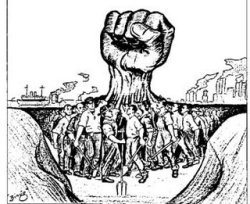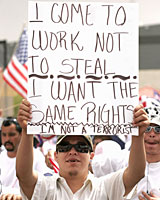Urban homesteading
So, I have an essay coming up in next month’s Freeman (thanks to the encouragement and editorial efforts of the indefatigable Sheldon Richman). It’s called Scratching By, and the theme is to explain how it’s not the free market, but rather the State, in its role as the invisible fist of corporate capitalism, that creates the material predicament faced by poor folks in American cities. One of the topics that I touched on there, and which I mentioned before in my comments on the South Central Farmers, is government control and planning of inner-city land use. Government regimentation of land squeezes poor people economically; perhaps more importantly, it also keeps them permanently in hock to, and at the mercy of, a select handful of politically-connected developers and slumlords. Last week, Women of Color Blog (2007-11-09) alerted me to the latest example: HUD’s continuing refusal to let New Orleans public housing residents return to their old homes, even two years after the fact. All for their own good, of course, whether or not they happen to think that they are best off living as permanent refugees. The plan is to begin demolishing the homes, now forcibly kept vacant, in order to make room for government redistribution of the land to connected developers for the usual urban renewal
projects.
A major human rights crisis exists in New Orleans and the Gulf Coast. It is a crisis that denies the basic rights to life, equality under the law, and social equity to Black, Indigenous, migrant, and working class communities in the region. While this crisis was in existence long before Hurricane Katrina, the policies and actions of the US government and finance capital (i.e. banking, credit, insurance, and development industries) following the Hurricane have seriously exacerbated the crisis.
One of the clearest examples of this crisis is the denial of the right to housing in New Orleans, particularly in the public housing sector. Since the Hurricane, the US government through the Department of Housing and Urban Development (HUD) has denied the vast majority of the residents of public housing the right to return to their homes. Unlike the vast majority of the housing stock in New Orleans, the majority of the public housing units received little to no flood or wind damage from the Hurricane. Yet, as of October 2007 only ¼ of the public housing units have been reopened and reoccupied. The Bush government refuses to reopen the public housing units in New Orleans because it appears intent on destroying the public housing system, demolishing the existing structures, and turning over the properties to private real-estate developers to make profits.
Based on the discriminatory Federal Court ruling issued on Monday, September 10th, all of the major public housing units in New Orleans are now subject to immediate demolition (the latest report from Monday, November 5th is that HUD will attempt to start the demolition on Monday, November 19th. However, this is being challenged by various legal advocates and will be delayed until at least Wednesday, November 28th pending a Federal court hearing). The first site on the schedule for demolition is the Lafitte housing project.
— My Private Casbah 2007-11-09: All Public Housing Units In New Orleans Set To Be Demolished
Now, I’m an anarchist. As such, I’m also intent — far more intent than George W. Bush could ever dream to be — on destroying the so-called public housing system. I hope to destroy it right along with the rest of the statist system of regimentation, rationing, command and control. But, the Department of Bulldozers’ opinions notwithstanding, destroying the system of control is not the same thing as knocking over the homes that the government controls. The hope is to liberate them and allow people to reclaim their lives from the domination of the State and the exploitation of state capitalism.
As far as these particular public
housing units are concerned, the proper question to ask is, who rightfully owns the homes that are set to be demolished? In the eyes of the State legal system, that’s the Housing Authority of New Orleans, a quasi-governmental non-profit corporation substantially under the control of its patron, the federal government’s Department of Housing and Urban Development. But neither HANO nor any other creature of the State can be the rightful owner of this or any other property. States are nothing more than massive criminal enterprises; they have no land and no money except what they expropriate from others by force. Their claim to the Lafitte housing project, like all their other claims, is fraudulent, because piracy is not a legitimate means for acquiring title to anything.
So if not HANO, who are the rightful owners? Well, when property has been lost or abandoned, it rightfully belongs to those who find it and put it to use. In the case of New Orleans and its government housing projects, that means that the people who should rightfully be regarded as the owners are not HUD or HANO bureaucrats, but rather the current tenants. Each resident has gained a legitimate ownership interest in her home, and in the land that it is built on, in virtue of occupying and homesteading it. Radical libertarians should recognize, on free market principles, that the federal government’s interventionist efforts to lock poor people out of their own homes and pass the land along to the nearest professional slumlord for development
should be regarded as nothing more or less than State-sponsored theft. Specifically, State-sponsored theft in the name of propping up the political-economic class system of landlordism.
The radical implications of the homesteading principle for urban housing extend far beyond New Orleans. In pretty much every major American city, there is a more or less permanent supply of vacant lots, burned-out plants, condemned buildings, and other land which has been held out of use for years, and will continue to be held out of use for years to come. Part of the reason that so much land remains idle is that formal title has often been seized by the city government or by quasi-governmental development
corporations, through the use of eminent domain, and the lots are simply abandoned while they await government public works projects or developers willing to buy up the land for large-scale building. In a free market, vacant lots and abandoned buildings should be available for homesteading by anyone willing to do the work of occupying and using them — which emphatically includes poor people in search of housing, a place to set up shop, land to cultivate for food, or for whatever other use they can put it to. It is only government intervention on behalf of state capitalism that keeps these lots shuttered and keeps them locked up in the hands of government bureaucrats and real estate developers; without statism there would be no political process of expropriation, demolition, redistribution, and redevelopment. Free people would be able to establish property rights in abandoned land, and thus provide their own housing, free of landlords and bulldozers, through their own sweat equity.
It’s because of this that I’ve been following the Take Back the Land movement in Miami with a lot of interest and a lot of sympathy. Their first project, the Umoja Village shanty-town (1, 2), was as good an example as you could like of socializing the land through direct action. And now, Max Rameau writes that their new project is to Take Back the Housing:
October 23, 2007 marks one year since the rise of the Umoja Village Shantytown in the Liberty City section of Miami in response to the crisis of gentrification and low income housing. In the year since this “people power” action, much has changed and much more remains the same. Black and other poor communities are ravaged by the crisis of gentrification and low-income housing while the same government which extracts taxes from us, does nothing to alleviate the crisis. One year later, the issue of community control over land remains fundamental in solving the crisis.
As the real estate bubble explodes around us, vacant foreclosed homes litter our communities and speculators choose to hold onto vacant houses and apartments, waiting for the next market swing in order to make their millions. For it’s part, in spite of all the scandal and crisis, Miami-Dade County doggedly maintains an unconscionable and immoral stockpile of vacant public housing units, units which otherwise would shelter some of the 41,000 families languishing on the housing assistance waiting list.
All the while, the homeless population grows, particularly among the
under-housed,those not living on the street, but doubling and tripling up in single family homes, including public housing, where the extra families live illegally, endangering the housing security of the entire extended family, sometimes right next door to a boarded up, vacant unit.We are forced to conclude that Miami-Dade County intentionally leaves units vacant, or tears down public housing all together–exemplified by the HOPE VI funded Scott-Carver public housing project demolition–as a means of fueling the real estate
boom.When governments take units of low-income housing off of the market, the value of the remaining privately held units increases, as families scramble to find new living arrangements. This is nothing short of tax financed market manipulation, designed to decrease supply at a time when demand is sky high, resulting in a government sponsored–not market driven–real estateboom.… In spite of the crisis, scandal and controversy, the reality is that local governments continue to enrich wealthy developers and have intentionally failed to address this crisis in any meaningful way. Neither Miami-Dade County nor the federal government operates based on the interests of poor Black people. As such, we are left with no other option than to provide for the people for whom the government is not providing.
Take Back the Land, again, asserts the right of the Black community to control land in the Black community. In order to provide housing for people, not for profit, this community control over land must now take the form of direct community control over housing.
Consequently, Take Back the Land has initiated the process of moving families and individuals into vacant housing, whether public, foreclosed upon or privately owned and intentionally vacated.
As of this writing, several families have already been moved into housing and several more are desperately awaiting their turn. We will move families and individuals into vacant housing units all across Miami-Dade County.
A true free market requires an end to what Benjamin Tucker rightly condemned as the land monopoly,
and a radical application of the homestead principle, which means that an awful lot of squatter’s rights
can and should be recognized as the basis of a just claim to the land. While I disagree with Tucker on some of the specifics of rightful land ownership — for example, I don’t think that rental contracts necessarily constitute abandonment of land — I do agree that absentee landlordism is artificially propped up by a pervasive and unjust system of government intervention on behalf of the rentier class. Abandoned land rightfully belongs to those who can reclaim it through occupancy and use. So three cheers from this libertarian to Take Back the Land, and here’s hoping that counter-economic urban homesteading will spread — throughout Miami, onward to New Orleans, and throughout every housing market currently clutched in the talons of land monopoly and state capitalism.
Further reading:
- Charles Johnson, Scratching By: How Government Creates Poverty As We Know It. Forthcoming in The Freeman (December 2007).
- GT 2007-11-08: Sprachkritik:
Privatization
- GT 2006-06-14: Enclosure comes to Los Angeles
- Murray Rothbard (1969), Confiscation and the Homestead Principle. Originally from Libertarian Forum; reprinted by William Gillis.


